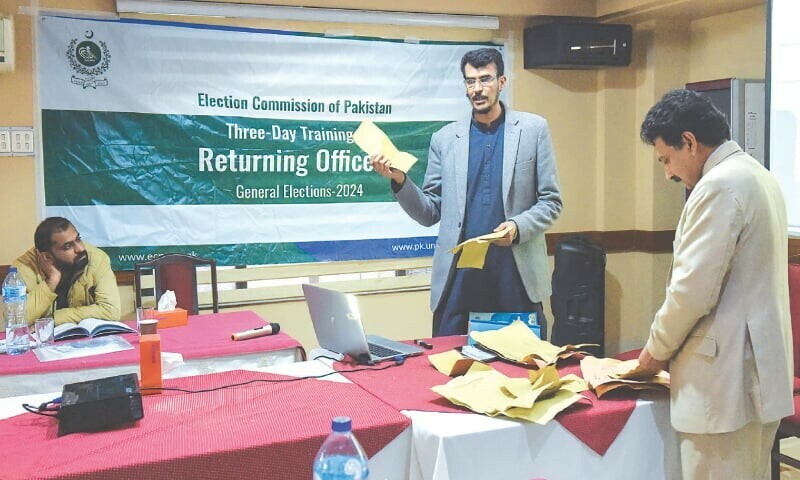ISLAMABAD: Following days of severe criticism over the delay in the announcement of poll results, the Election Commission of Pakistan (ECP) has defended itself, saying a litany of security and logistical challenges impeded the process.
For four days since Feb 8, mum was the word from the commission as people waited for the final consolidated results. There were also claims of alleged rigging and manipulation of results to change the winning candidates.
In a detailed statement on Monday, the commission said saving human lives and ensuring accuracy was more important than the swift announcement of election results.
The policy statement, issued by ECP Spokesperson Nighat Siddique, came on the same day when caretaker Prime Minister Anwaarul Haq Kakar held a press conference and defended the commission’s performance.
The spokesperson said the commission grappled with a host of challenges before and during the electoral process, and it had to take various steps to deal with them.
The issues such as peaceful polling, security of polling staff, transportation of polling material and accurate compilation of election results were prioritised by the ECP to ensure peaceful elections despite security challenges.
It would have been inappropriate to put human lives at stake and cast doubts over the accuracy of election results for prompt result declaration, the statement said.
While citing terror attacks in Balochistan and Khyber Pakhtunkhwa in the lead-up to the polls, the spokesperson said the conduct of elections was “a challenge”.
There was a danger of jeopardising the entire election process by risking human lives to speed up the election process and especially the results.
Logistical challenges
The statement noted that the suspension of mobile networks, lack of communication access, polling stations in far-flung areas, travel at night, harsh weather and snow, and sit-ins by political parties caused difficulties in the transportation of election results.
Helicopters were also used to transport polling staff and materials in some areas of Balochistan, the statement claimed.
In the wake of the security situation and to ensure coordination, the offices of five to six returning officers were set up in one place in many parts of the country.
After the polling, crowds gathered outside these offices, making it difficult for the staff to submit the polling material.
This further delayed the compilation of the election results.
The commission also claimed that there was a mixed polling trend in areas where the election results were delayed, and no single party benefited or lost in any way due to the delay.
Concerns over EMS
The commission also defended the performance of its Election Management System (EMS) and said its primary task was to prepare and edit results submitted by presiding officers to returning officers (RO).
The presiding officers at polling stations had to prepare Form-45 — which carries the tally of votes polled at each polling station — and send it electronically to the RO concerned.
The Form-47 (provisional result) had to be prepared and announced at the RO office.
The commission said under Section 90 of the Elections Act 2017, presiding officers had to reach their RO’s office in person. The EMS installed in ROs’ offices was not dependent on internet connectivity and worked satisfactorily.
The statement pointed out the EMS mobile app installed in the mobile phones of the presiding officers needed cellular connectivity to send Form-45.
Since cellular service was switched off, the presiding officers were unable to send the data to ROs.
The coordination and transportation process was badly affected due to the closure of mobile phone signals, which led to further delays.
“It is important to mention that in the 2018 general elections, the first result was received at 4am while in 2024, the first result was received at 2am,” the spokesperson claimed.
Similarly, in 2018, the results were completed in about three days, while this time, the election results were completed in one and a half days, except in some constituencies.
Despite these difficulties, the ECP was able to hold peaceful elections and successfully complete “a huge operation,” as acknowledged by civil society organisations and observers.
The commission rejected the allegations of widespread rigging except for a few constituencies where “isolated incidents” of malpractice took place.
The statement added that forums were available to the candidates and partied for the redressal of rigging complaints.
Moreover, four counters have been set up at the ECP Secretariat in Islamabad for litigants to file complaints over alleged rigging.
Case against Firdous Ashiq
Separately, Istehkam-i-Pakistan Party leader Dr Firdous Ashiq Awan appeared before the commission for slapping an on-duty police officer during the polling.
She was issued a notice to appear before the commission after a complaint was filed against her.
Dr Awan said as a candidate, she had the right to visit polling stations and, during these visits, found that police were unable to control hooligans.
She claimed to have pointed out the issues to a police officer standing at a polling station and asked what was being done to solve the,
The IPP leader claimed she received no response and accused the police of being “silent spectators” and “facilitators”.
She said in such situations, tempers flare up but tendered an apology over her conduct.
Her lawyers contended that unless they were provided with a copy of the complaint, they could not file a reply.Later, the ECP ordered Dr Awan to submit a reply on February 15.
Published in Dawn, February 13th, 2024







